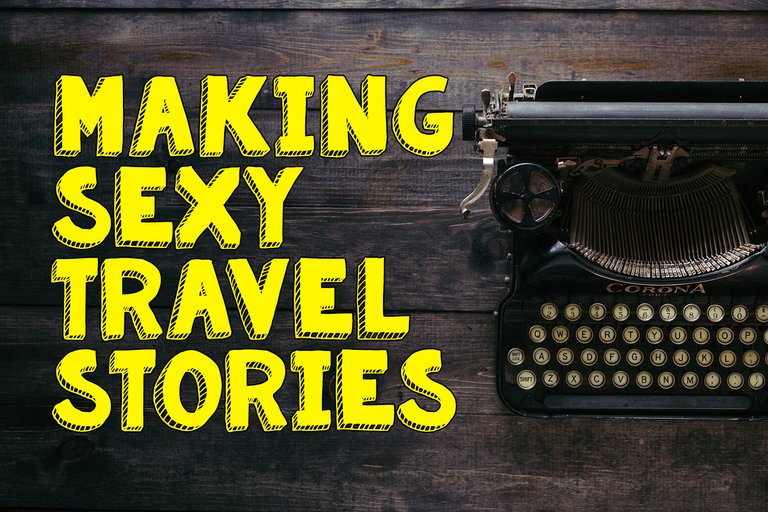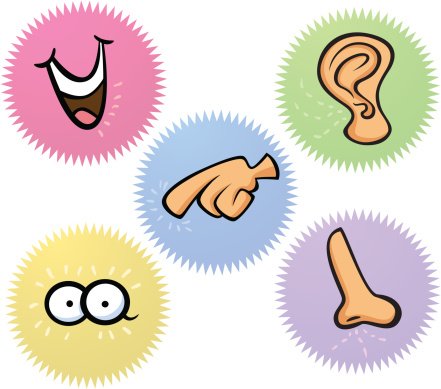Aloha shaka-lakas! How are you? Coming up to share some ideas for Travel Writers!
Whenever we unleash the mighty fingers to write travel articles, deep inside our hearts the goal is to forward emotions that delighted us . We want to engage with the readers by transporting them to a particular moment, or to inspire a connection with like-minded individuals. It's like sitting around a fireplace with friends and sharing your adventures, except that we have to transcribe into words.
There are several ways to express emotions: Through breathtaking photographies, writing thoughtful texts, painting. If you can combine ALL in a post, greater are the chances to captivate the audience.
So, inspired by the sexy newcomers, I released moons ago an article entitled TRAVEL FEED: Tips For Writing Travel Articles. On that post, I highlighted general guidelines to help with post composition and ideas generation for a more appealing article.
On this post, I want to dive deeper into the text aspect of travel writing, about producing meaningful compositions. Keep in mind that each writer develops a style, same as each reader has a reaction; by any means I want to interfere and impose rules on the way people write. Enjoy!

What I want to present, are topics that I have identified as weaknesses on several texts I read each day, including mine. By studying these concepts, I've improved beyond expectations and boosted enough confidence to write my first book. You also can do it!
1. Criticize Yourself
Don't let good enough get in the way of perfection, even if your plan is to vomit several posts per day. Harsh self-criticism represent a powerful tool for improvement; it pushes us forward and into searching for answers, be curious!
Some of us are natural writers. Other - like me - require more time and practice, especially when we are not native speakers of the English language. If you release posts and never analyse them, you won't open the doors for improvement. But if you try making it perfect, you'll end up discovering a whole universe to explore.
- Use the internet on your favour;
- Whenever you have a doubt, search or ask;
- If you have to modify a text, do it;
- Quality over quantity, always!;
Whenever you write a travel article, ask yourself:
If I sit around a fireplace with my friends, will they listen to this story the way it's written here? Or they'll focus on their phones.
However, don't let perfection get in the way of practice. Write, post, have fun! But always go back to old texts searching for areas to improve. That's the best path to expand vocabulary and refine grammar.
1. Show, don't tell
Don't confuse this for including tons of photographies onto the post. Even though pictures embellish a composition, most often people contemplate them and walk away. If you are writing to provoke emotions, pictures will kill the vibe.
Whenever I come back from an adventure, friends don't want to see the photos; they want to listen. It's all on the way you talk.
The concept of show don’t tell is the epicenter to attach readers to the emotional aspects of your adventure. This leading part of writing is frequently forgotten and is difficult to master. But once engraved on your style, it'll forge a deeper connection with your readers and generate long-lasting audiences.

Image by mstay on Getty Images
The idea behind this writing technique is to teleport the reader to the experience. You can achieve this effect by exploring the human brain and enhancing the five senses in a written structure. Remember, a person who consumes travel content mostly don't have the chance to be where you were. While reading they can feel and imagine the situation by creating a vivid image. If you give away those sensations by telling, you kill the imagination.
Here' a direct example:
TELL: I was happy to be there.
SHOW: Being there brought tears into my eyes.
Since show don't tell could have a post for itself, I'll list some practices that can help showing, instead of telling.
- Avoid basic sensorial words (I felt, I heard, It smelled);
- Avoid explaining emotions with basic words (I was happy, sad, angry, etc);
- Focus on the senses!;
Don't tell me it was tough to go up that mountain. Describe you tripping, the rain falling and the sounds your backpack made when the strap snapped, show how it echoed when you shouted.
Don't tell me you hated the restaurant you've been to. Describe the disgusting person smoking by your table and how the waiter mumbled every time you asked for something.
Don't tell it started raining. Describe how the birds went crazy and how leaves flew past you and how there was an earthy smell before the storm.
I know it sounds complex and over simplified here, but you get the idea. (if you want, I can write a post focused on show don't tell)
2. Avoid Adverbs
An adverb is a word that changes the meaning of the verb, adjective or another adverb. It's one of the most common artifacts used to describe something you are doing by slightly modifying the verb. You see what I did there? The word slightly changes the verb to modify.
Adverbs are not mood killers, but they distract the reader and simplify a scene that can be enriched if you deployed more meaningful words - it signals you were lazy to write.
I'll put myself on the front-line for critics and demonstrate an example from my book.
HOW IT WAS: We were totally broke and heavily drunk, so we drunkenly went back to the tents.
HOW IT IS: Assured that the wallets dried up by the time being, each one of us lurched back to the tents.
Notice how the adverbs not only made the 1st phrase annoying to read, but they also killed the imagination. You know we were broke and drunk.
On the second phrase, the stronger verbs almost showed us searching for money on the empty wallets and deciding it was time to go home. You can also assume we were drunk, because we lurched on the way.
It's an excellent exercise to search for adverbs and try to find stronger verbs to substitute; your vocabulary will expand rapidly. Pa-dum-tss.
3. Dialogues, dialogues, dialogues!!

I know it doesn't fit every style, but there's no other tool better than dialogues to bring to life all those characters you met on the road. Dialogues are real-time teleport machines of joy for a reader.
Do you remember that friendly old woman, owner of that hostel you've stayed at in eastern Europe. Yes, don't say the hostel owner was a friendly old woman. Instead, present a dialogue you've had with her, it gives a helluvah vibe to your article.
4. Avoid Passive Voice
In passive voice the subject receives an action, whereas in active voice the subject performs an action. Passive voice weakens the phrase, making it unclear, less direct and wordy.
Simple example:
Passive: The phrase is weakened by the verb.
Active: The verb weakens the phrase.
Often times I spot passive voicing on travel posts as weak verbs (i.e. to be) or adverbs (there is/was). They are not grammatically incorrect, but they make a dull phrase.
Example:
Passive: It felt great stretching with the smell of wet grass. There was frost over the tent and the logs from the night before were still burning inside the round fireplaces..
Active: Morning stretches with the smell of dewy grass boosted the energy. Frost lasted over the tent, but the logs from the night before still cracked inside the round fireplaces..
Even though the first phrase isn't wrong, it puts the writer as the central piece, when the apex is the scene. The second phrase makes reading more fluid, but it requires more energy to write if you don't dominate the words (like me).
Every so often you may want to use passive voice, if you want to create curiosity or if the subject is unknown. I.e. The tent was broken. You don't know who broke it, nor it's important.
Usage of passive and active voice is complex. But whenever you have the chance, try verifying if you can change it to embellish your phrase. I guarantee it'll create a better effect.
Conclusion
Mastering writing requires study and practice and should be treated as a form of art; same as photography, painting and playing instruments. The uttermost goal is to express yourself in a way to pass a message and evoke emotions on the receivers.
This post is a glimpse of the complexities that turn a poster into a writer, it gives you some aspects that you might want to look for. Also remember that a good post, book or any other publications takes time — sometimes days — to be forged. Quality over Quantity!
Were the tips helpful to you? Share on the comments!
If you liked this post, please, consider leaving your upvote for a hot coffee.
~Love ya all
Disclaimer: The author of this post is a convict broke backpacker, who has travelled more than 10.000 km hitchhiking and more than 3.000 km cycling. Following him may cause severe problems of wanderlust and inquietud. You've been warned.
Parabéns, seu post foi selecionado pelo projeto Brazilian Power, cuja meta é incentivar a criação de mais conteúdo de qualidade, conectando a comunidade brasileira e melhorando as recompensas, obrigado!
Share this post on twitter! #posh
Great post and with great tips on how to produce better texts.
Only if people read it =/
Thanks for the comment!
I still think that books, food and photographs transport you to incredible places!
Without a doubt! Any form of art, if used with wisdom, can move people. I just hope that the times of internet and fast-pacing writing doesn't prejudice the power of words.
Congratulations @mrprofessor! You have completed the following achievement on the Hive blockchain and have been rewarded with new badge(s) :
You can view your badges on your board and compare to others on the Ranking
If you no longer want to receive notifications, reply to this comment with the word
STOPDo not miss the last post from @hivebuzz:
Vote for us as a witness to get one more badge and upvotes from us with more power!
The passive voice always gets me, no matter how much I try, it gets in, darn it.
Also, no matter how brilliantly wicked you are at writing, the composition is the key to a perfect looking masterpiece! 😋 But hey ho, we are all getting better at it day by day! I wish I would be a writer already muahahaha!
So you get caught by the passive voice? haha pa-dum-tss
Some people have the touch to turn the dullest of the activities into something worth reading about. Do you have around that text about the guys observing animals in Antartica? I remember you being excited about that text.
And also, be prepared! I'll ask you to check my book once it's done. Please?
Here it is:
https://hive.blog/introduceyourself/@bluebottlefilms/the-friendly-whale-a-blog-from-the-map-to-paradise-a-documentary-by-bluebottle-films
And of course, I will be happy to check that book of yours! 😉
Yiiisss! This is the one, so well-written, inspirational. I'll grab the sailboat and head to Antartica, be right back.